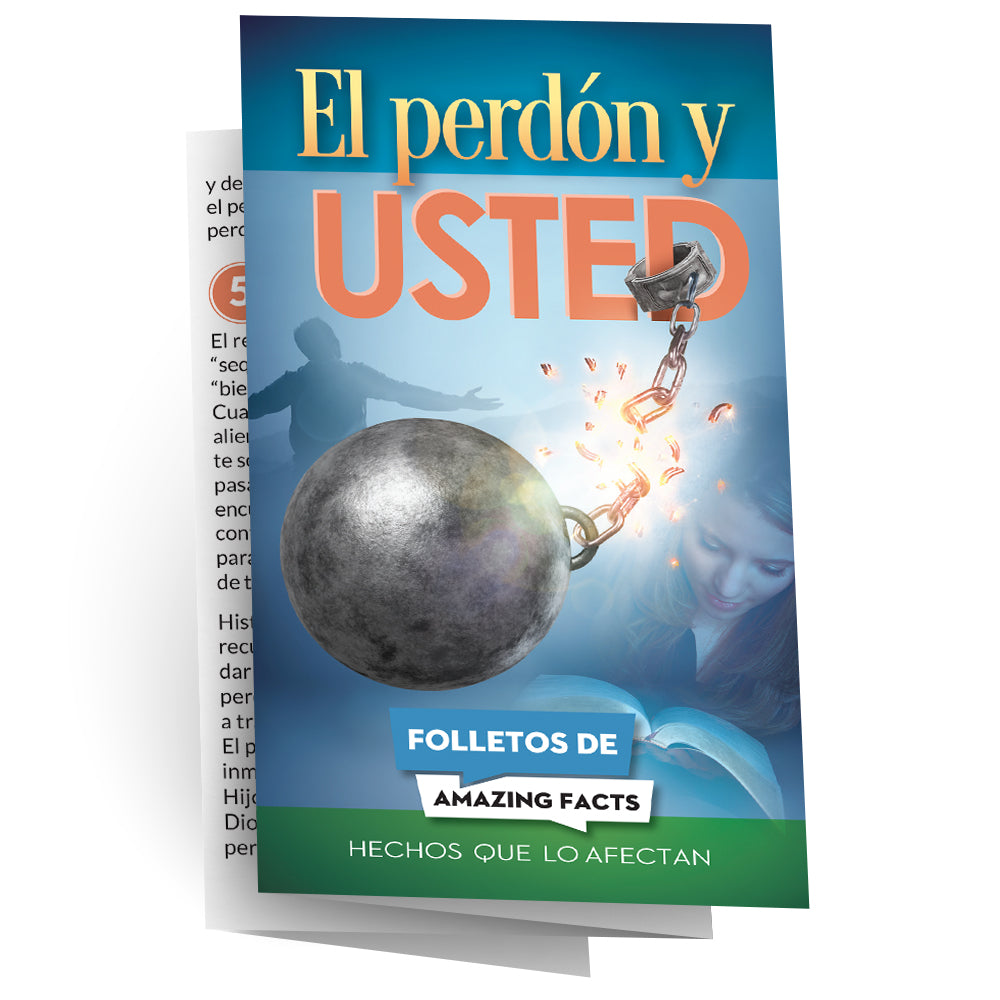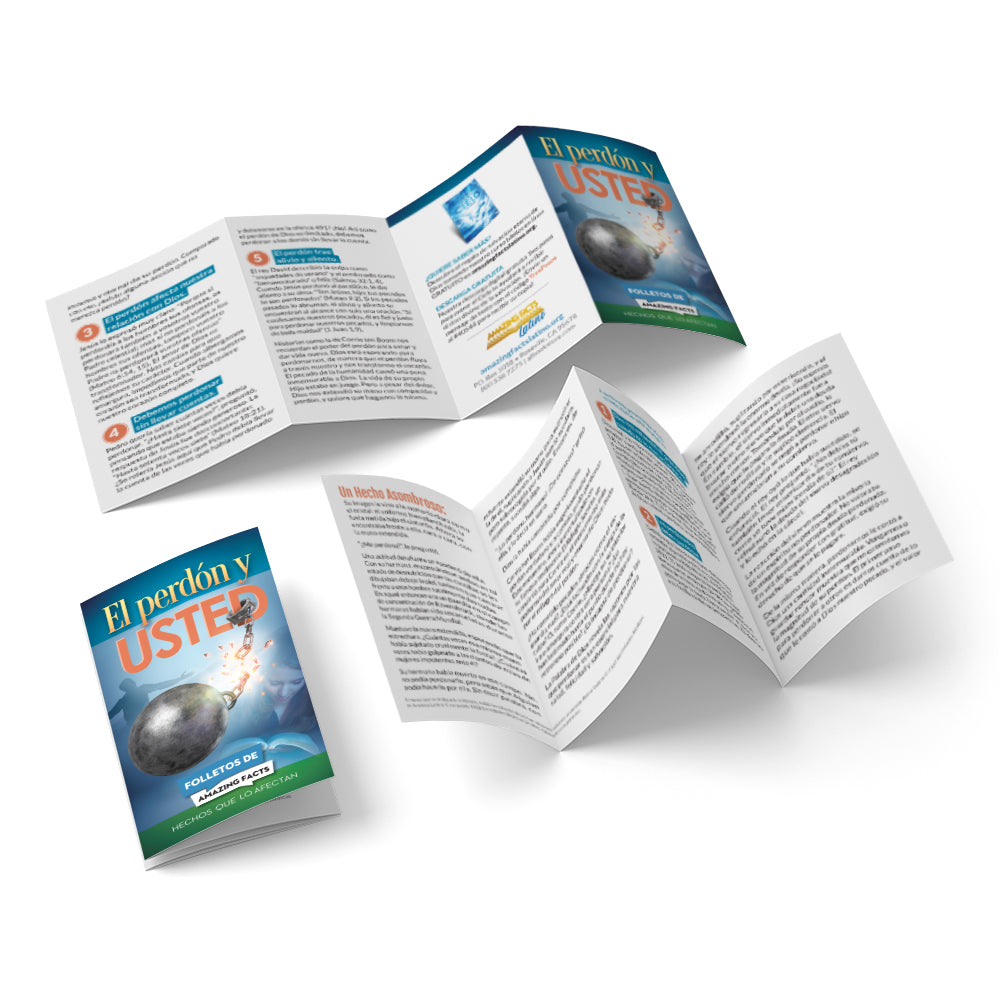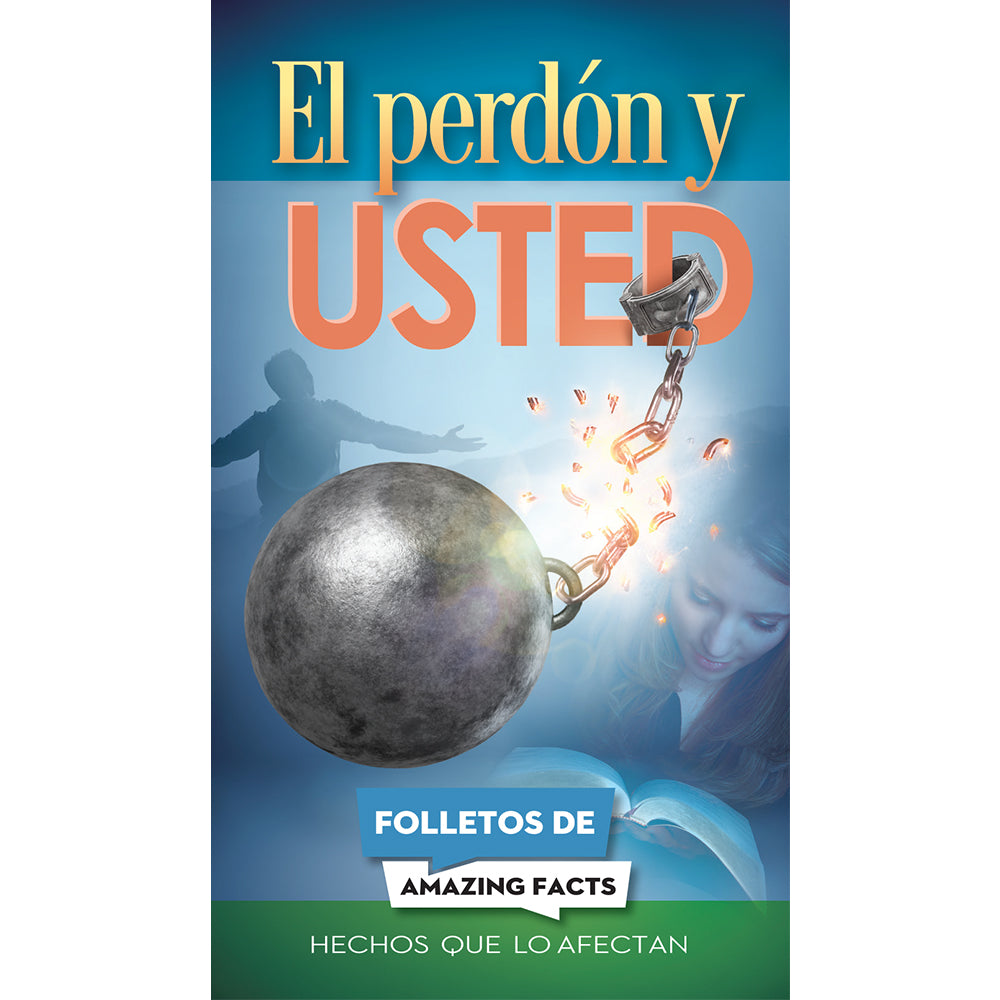



Amazing Facts
Afacts Tracts (100/pack): El Perdón y Usted
Afacts Tracts (100/pack): El Perdón y Usted
1
6615 Sierra College Boulevard
Granite Bay CA 95746
United States
Topic: Forgiveness
Sample of the text on this tract:
Un Hecho Asombroso:
Su imagen le vino a la memoria clara como
el cristal: el uniforme bien planchado, la
fusta metida bajo el cinturón. Ahora se
encontraba frente a ella, cara a cara, con
la mano extendida.
“¿Me perdona?”, le preguntó.
Una actitud desafiante se apoderó de ella.
Con su hermana, encontrándose ambas en tal
estado de desnutrición que las costillas se les
dibujaban debajo la piel, tuvieron que caminar
frente a este hombre totalmente desnudas.
En aquel entonces era un guardia en el campo
de concentración de Ravensbrück, donde las
hermanas habían sido encarceladas durante
la Segunda Guerra Mundial.
Mantuvo la mano extendida, esperando que la
estrechara. ¿Cuántas veces esa misma mano
había sujetado cruelmente la fusta? ¿Cuántas
veces había golpeado a las cientos de miles de
mujeres impotentes ante él?
Su hermana había muerto en ese campo. No,
no podía perdonarlo, pero sabía que Alguien
podía hacerlo por ella. Sin decir palabra, con
esfuerzo extendió su mano para estrechar
la de él, suplicando a Jesús que le ayudara,
pero sobrecogida por el odio. Entonces, de
repente, sucedió algo.
“¡Lo perdono, hermano! ¡De corazón!” gritó
ella, y lo decía en serio.
Dios la había cambiado por completo.
Corrie ten Boom había experimentado el
perdón verdadero y, a cambio, pudo perdonar.
Este encuentro, ahora inmortalizado en
su famoso testimonio El Refugio Secreto, se
convirtió para Corrie en el monumento más
poderoso del amor real y eterno de Dios: todo
por el milagro del perdón.
¿Ha cometido pecados atroces como el exguardia
nazi? ¿Está luchando con la carga de la
culpa? O, como Corrie, ¿alberga en su interior
ira o amargura contra otra persona? ¿Lo
han lastimado hasta el punto donde no hay
retroceso posible? ¿Es incapaz de perdonar?
La Palabra de Dios revela las razones por las
que perdonar es tan esencial para nuestra
salud, felicidad y salvación.
A continuación presentamos cinco
verdades bíblicas sobre el perdón:
Dios nos extendió el perdón
cuando no lo merecíamos.
Dios envió a su Hijo a morir por nuestros
pecados “siendo aún pecadores” (Romanos
5:8). No merecíamos su compasión, pero
el perdón es parte del carácter de Dios.
Cuando Dios se apareció a Moisés en el
Monte Sinaí, se describió a sí mismo como
“misericordioso y piadoso, tardo para la ira,
[…] que guarda misericordia a millares, que
perdona la iniquidad, la rebelión y el pecado”
(Éxodo 34:6, 7). El carácter misericordioso
de Dios lo llevó a perdonar a sus enemigos.
Los perdonados
deben perdonar.
Debido a que Dios nos perdona, debemos
extender el perdón a otros en cuestiones
importantes o insignificantes. En Mateo
18:21-35 Jesús compartió la parábola del
siervo que no perdonaba. Un siervo debía
miles de millones de dólares al rey. Como no
podía pagar la deuda, iban a vender al siervo,
a su familia y todas sus pertenencias. El siervo
se arrodilló, suplicando por misericordia, y el
rey le perdonó la enorme deuda. ¡Se suponía
que el siervo regresaría a su casa regocijado!
En cambio, el siervo inmediatamente fue a
buscar a otro siervo que le debía una deuda
mucho menor. Tomándolo por el cuello, le
exigió que le pagara la deuda. El otro siervo
calló de rodillas y le suplicó clemencia. El
siervo perdonado se negó a perdonar e hizo
que encarcelaran a su consiervo.
Cuando el rey oyó lo que había sucedido, se
enfureció. El rey preguntó: “¿No debías tú
también tener misericordia de tu consiervo,
como yo tuve misericordia de ti?”. El rey
reinstauró la deuda del siervo desagradecido
y lo echó en la cárcel.
La reacción del siervo muestra la miseria
de un espíritu no perdonador. No valoraba
la magnitud de su propia deuda perdonada.
En vez de responder con gratitud, exigió su
derecho de que se le pagara.
De la misma manera, perdonarnos le costó a
Dios una cantidad inmensurable. Vengarnos o
guardar rencor muestra que no entendemos
la magnitud de su perdón. El primer paso
para perdonar a otros es darnos cuenta de lo.
Topic: Forgiveness
Easy-to-share leaflets on popular Bible topics!
Packets of 100 for only $9.95.
Amazing Facts Tracts stand out from the crowd.
- Larger size to grab attention (but still fits in your pocket)
- Free link to a magazine, book, or video download
- Easy to read type
- Covers key Bible teachings
- Connects to free Bible study guides
- Use with evangelism tracking database
- Nurture leads with follow-up emails on the tract topic
Equip yourself, your members, your personal ministries team, and your outreach events with these colorful, inexpensive, eye-catching tracts that can be spread out like the leaves of autumn.
Each topic introduces a central Bible topic and then links the reader to free Bible studies and a free resource that can be downloaded simply by sending a text message. Watch for more popular topics coming soon!
Text on tract:
An Amazing Fact: She saw him, crystal clear in her memory—the crisp uniform, the riding crop tucked under his belt. Now he stood in front of her, face to face, with hand outstretched.
“Will you forgive me?” he asked.
Defiance rose within her. She and her sister, so malnourished that their ribs stuck out like corners, had once had to walk stark naked past this man. He had been a guard then, in the Ravensbrück concentration camp where she and her sister had been imprisoned during World War II.
He held his hand out, still waiting for her response. How many times had that same hand been curled cruelly around his crop? How many times had it struck the hundreds of thousands of women weaker than he?
Her sister had died in that camp. No, she could not bring herself to forgive him—but she knew that Someone else could. Wordlessly, she forced her hand into his, pleading to Jesus for help but feeling nothing but hate. Then, suddenly, something happened.
“I forgive you, brother! With all my heart!” she cried out—and she meant it.
God had changed her from the inside out.
Corrie ten Boom had experienced true forgiveness and, by God’s grace, was able to give forgiveness in return. This single encounter, now memorialized through her famous testimony The Hiding Place, became to Corrie the most powerful monument of God’s real and everlasting love—all through the miracle of forgiveness.
Have you committed unspeakable sins, like the former Nazi guard? Are you struggling under a burden of guilt? Or have you, like Corrie, kept locked deep inside of you anger or bitterness against another person? Has someone else hurt you past the point of no return? Are you unable to forgive?
God’s Word reveals the reasons behind why forgiveness is so essential to our health, happiness, and salvation.
Here are 5 biblical facts about forgiveness:
- God extended forgiveness when we didn’t deserve it.
God sent His Son to die for our sins “while we were still sinners” (Romans 5:8). We didn’t deserve His compassion, but forgiveness is part of God’s character. When God appeared to Moses on Mt. Sinai, He described Himself as “merciful and gracious, longsuffering … keeping mercy for thousands, forgiving iniquity and transgression and sin” (Exodus 34:6, 7). God’s merciful character led Him to offer forgiveness to His enemies.
- Forgiven people should forgive people.
Because of God’s forgiveness for us, we should extend forgiveness to others in matters big and small. In Matthew 18:21–35, Jesus shared the parable of the unforgiving servant. A servant owed the king billions of dollars. Since he couldn’t repay the debt, the servant, his family, and his possessions would all be sold. The servant fell on his knees, begging for mercy, and the king forgave the enormous debt. The servant should have returned home rejoicing! Instead, the servant immediately found a fellow servant who owed him a much smaller debt. Grabbing his throat, he demanded repayment. The other servant fell on his knees and begged for mercy. The forgiven servant refused to forgive and had his fellow servant thrown into prison.
When the king heard what happened, he was furious. “Should you not also have had compassion on your fellow servant, just as I had pity on you?” the king asked. The king reinstated the ungrateful servant’s debt and threw him in prison.
The servant’s response shows the ugliness of an unforgiving spirit. He didn’t value the magnitude of his own forgiven debt. So instead of responding with gratitude, he demanded his right to be repaid.
Likewise, forgiving us cost God an immeasurable amount. Exacting revenge or holding a grudge shows we don’t understand the magnitude of His forgiveness. The first step in forgiving others is realizing what our sin cost God—and the immense, eternal value of His forgiveness. Compared to that, is anything unforgivable?
- Forgiveness affects our relationship with God.
Jesus spoke clearly about this: “If you forgive men their trespasses, your heavenly Father will also forgive you. But if you do not forgive men their trespasses, neither will your Father forgive your trespasses” (Matthew 6:14, 15). God’s love is transformative. It changes us to reflect His character. When we nurse bitterness, we’re keeping part of our heart from being transformed—and God wants our entire heart.
- We should forgive without keeping score.
Peter wondered how often he ought to forgive. “Up to seven times?” he offered generously. Jesus’ response was startling: “Up to seventy times seven” (Matthew 18:21). Did Jesus mean Peter ought to keep track and stop forgiving on the 491st offense? No! Since God’s forgiveness is limitless, we should forgive others without keeping count.
- Forgiveness brings relief and encouragement.
King David described guilt as a “drought of summer” and the forgiven person as “blessed” or happy (Psalm 32:1, 4). When Jesus forgave the paralytic man, He offered his soul encouragement: “Son, be of good cheer; your sins are forgiven you” (Matthew 9:2). If past sins are weighing you down, relief and encouragement are only a prayer away. “If we confess our sins, He is faithful and just to forgive us our sins and to cleanse us from all unrighteousness” (1 John 1:9).
Stories like Corrie ten Boom’s remind us of the power of forgiveness to heal and bring new life. God is waiting to forgive you so that His forgiveness can flow through you and change your heart. Humanity’s sin caused God tremendous pain. The life of His own Son was at stake. But despite the pain, God reached out to us with compassion and forgiveness—and He wants us to do the same.